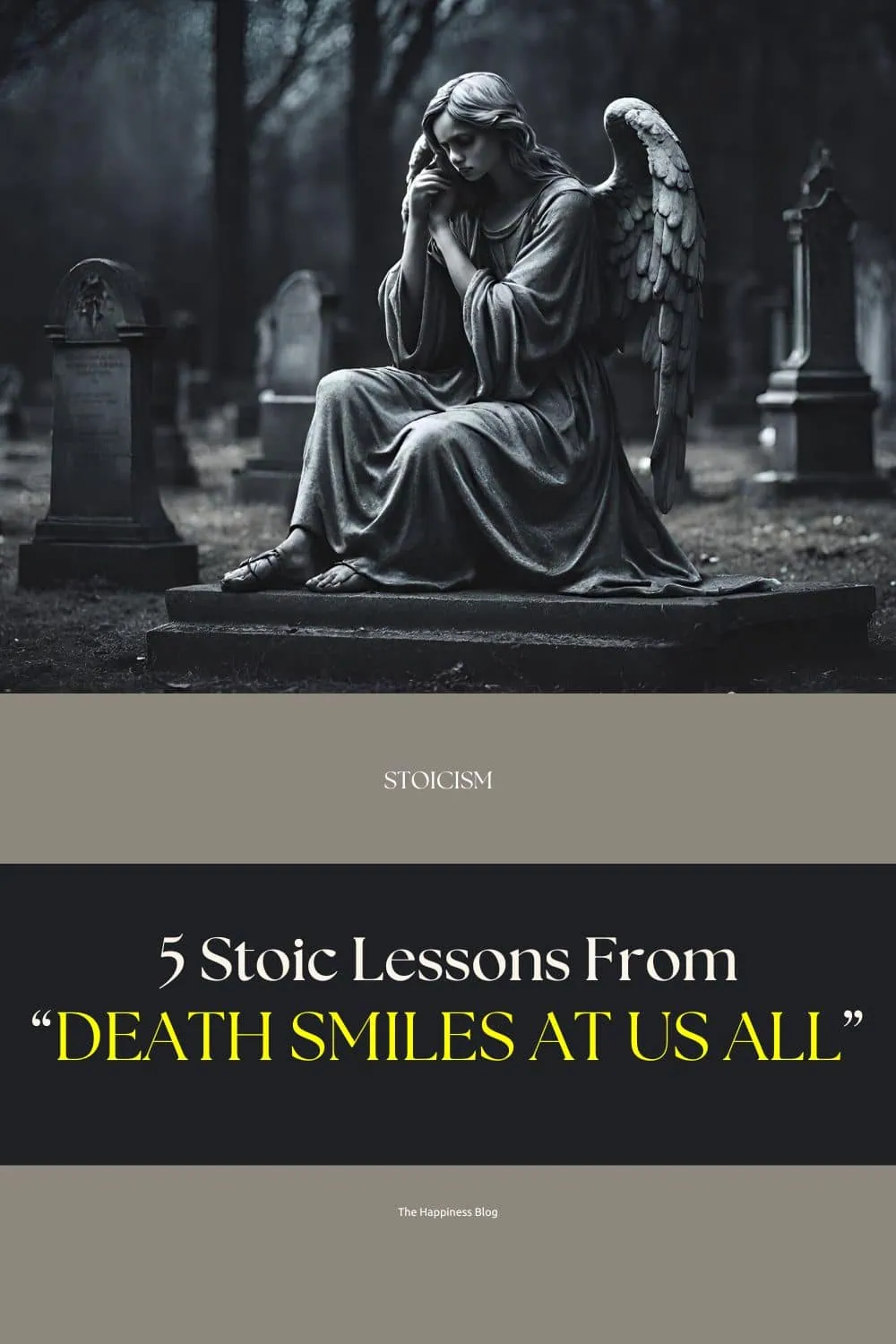Today's Thursday • 7 mins read
— By Dr. Sandip Roy.
First things first: The famous quote “Death smiles at us all. All a man can do is smile back” was not uttered or written by the Roman Emperor and Stoic philosopher Marcus Aurelius.
Maximus, the hero of The Gladiator, said it at a pivotal moment in the film.
At first glance, the quote may sound somewhat dark and morbid. But on reading it a few times, it slowly reveals some of the most pivotal lessons in Stoicism.
5 Timeless Stoic Lessons From The Quote “Death Smiles At Us All”:
Lesson 1: Accept The Inevitable
The Stoics were clear that only a few things in this world are within our control, while the vast majority are not. They understood it by the principle of The Dichotomy of Control.
They were very sure we should strictly focus on things we can control, like our thoughts, beliefs, and actions.
And graciously accept those things we cannot control, like other people and external events.
Death is an inevitable, external event over which we have little control.

When we choose to accept death as an uncontrollable event that will happen to everyone, we lessen its terrifying power. Then, we can fearlessly focus on living our lives to the fullest.
Epictetus, the slave who became a Stoic master, famously said,
“Men are disturbed not by things, but by the view which they take of them.”
So, if we would rather not feel disturbed by death, we must accept its unpredictability and universality, and focus on doing our duties beginning right now.
Lesson 2: Live In The Present
Another critical lesson from the quote is the importance of living in the present moment.
The Stoics believed that we should not worry about the past or the future, as they are both beyond our control.
The past makes us overthink what we cannot change, while the future makes us anxious about its uncertainties.
But by focusing on the present and enjoying the current moment, we can experience genuine happiness and fulfillment.
By acknowledging the impermanent nature of life, Stoics strive to make the most of the present moment, living fully and mindfully, without being consumed by anxiety or fear about the end of life.
“Remember also that each man lives only the present moment: The rest of the time is either spent and gone, or is quite unknown. It is a very little time which each man lives, and in a small corner of the earth; and the longest surviving fame is but short, and this conveyed through a succession of poor mortals, each presently a-dying; men who neither knew themselves, nor the persons long since dead.”
— Marcus Aurelius, Meditations 2.10
Seneca, the prominent Stoic philosopher, once said,
“We are more often frightened than hurt, and we suffer more in imagination than in reality.”
Lesson 3: Build Your Resilience
Stoicism teaches us to be resilient in the face of adversity.
Resilience is the ability to bounce back after setbacks and grow from hardships.
By recognizing that death is a natural part of life that no one can escape, we can develop a sense of courage and inner resilience.
“What doesn’t kill you makes you stronger,” remarked Friedrich Nietzsche, the famous 19th-century German philosopher. That quote shows Stoic resilience perfectly.
This strength can help us overcome obstacles and face difficult situations with grace and composure.
Marcus Aurelius is said to have said (though no written records of this exist),
“You have power over your mind – not outside events. Realize this, and you will find strength.”
Lesson 4: Practice Gratitude
Instead of dwelling on the inevitability of death, we can choose to be grateful for the time we have.
Stoicism encourages us to practice gratitude and appreciate the small joys of life.
Epictetus, the Stoic sage, said,
“He is a wise man who does not grieve for the things which he has not, but rejoices for those which he has.”
By appreciating and being thankful for what we have, we can live more peacefully and stay better prepared for life’s challenges.

Lesson 5: Be Ready for Death, Unafraid
The fifth and final lesson from the quote is to face death with courage and without fear.
The Stoics believed that we should prepare ourselves for death by practicing virtue and wisdom throughout our lives.
By doing so, we can approach our final moments with confidence and peace.
As the Stoic scholar Seneca said,
“The day which we fear as our last is but the birthday of eternity.”
FAQs
Do Stoics think about death?
Did Marcus Aurelius actually say death smiles at us all?
What did Marcus Aurelius say about death?
1. Think of yourself as dead. You have lived your life. Now, take what’s left and live it properly. What doesn’t transmit light creates its own darkness. — Meditations, 7.56
2. You may leave this life at any moment: have this possibility in your mind in all that you do or say or think. — Meditations 2.11
3. Don’t behave as if you are destined to live forever. Death hangs over you. While you live, while it is in your power, be good. Now. — Meditations 4.17
4. When the longest- and shortest-lived of us dies, their loss is precisely equal. For the sole thing of which any of us can be deprived is the present, since this is all we own, and nobody can lose what is not theirs. — Meditations 2.14
5. Accept death in a cheerful spirit, as nothing but the dissolution of the elements from which each living thing is composed. — Meditations 2.17
What is Latin for death smiles at us all…?
Final Words
The quote (rather a misquote) “Death smiles at us all. All a man can do is smile back” asks us to live with the Stoic values of acceptance, mindfulness, resilience, gratitude, and courage when facing death, ready when it comes.
All of us can smile back at death with courage and poise.
√ Please share it with someone if you found this helpful.
√ Also Read: 10 Marcus Aurelius Quotes (From His Book “Meditations”)
• Our Story!
